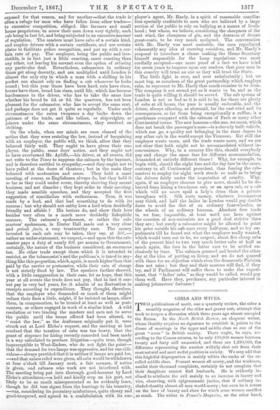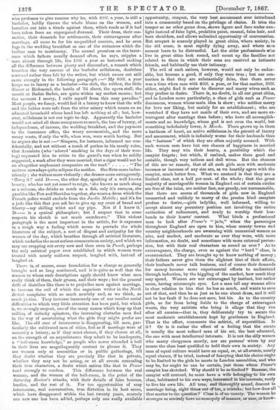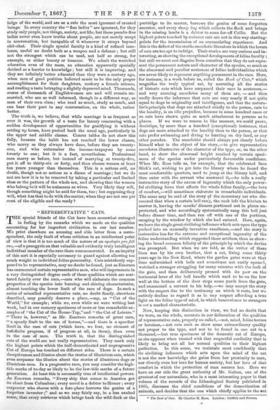Gnus AND WIVES. T WO publications of merit, one a quarterly
review, the other a monthly magazine of the elder and graver sort, attempt this week to reopen a discussion which three years ago almost occupied the Recess. In the North British Review, an eloquent writer, whose identity requires no signature to establish it, points to the disuse of marriage in the upper and middle class as one of the great " sores " in British society. There ought, he says, ac- cording to the Census returns, to be only 400,000 women between twenty and forty still unmarried, and there are 1,230,000, the difference representing the number wilfully shut out from their most natural and most useful position in society. We may add that this frightful disproportion is mainly within the ranks of the so- called middle class. Peasant women all marry, and the workmen, amidst their thousand complaints, certainly do not complain that their daughters cannot find husbands. He is evidently in- clined to attribute the evil mainly to an increase in luxury and vice, observing, with epigrammatic justice, that if celibacy in- cluded chastity almost all men would marry ; but even he is severe on the love of luxury and show for which some women sacrifice so much. The writer in Fraser's Magazine, on the other hand, who professes to give reasons why he, with 800/. a year, is still a bachelor, boldly throws the whole blame on the women, and launches out into a tirade against them, which reads as if it had been taken from an expurgated juvenal. Their dress, their cos- metics, their demands for settlements, their extravagance after marriage, all come in for his unqualified censure, and he even lugs in the wedding breakfast as one of the nuisances which dis- incline men to matrimony. The annual premium on the insur- ance which fathers usually demand often, he says, cripples a man almost through life, the 100/. a year so bestowed making all the difference between plenty and discomfort, a remark which breathes the very essence of the bachelor selfishness, doubtless assumed rather than felt by the writer, but which comes out still more strongly in the following paragraph :—" My 800/. a year keeps me in luxury as a bachelor—the club, the rubber, the little dinner at Richmond, the bottle of '34 claret, the opera stall, the month at Baden Baden, are quite within my modest means ; but the moment I marry, I exile myself from this easy paradise." Most people, we fancy, would feel it a luxury to know that the wife and the babies were safe from the utter misery which conies on an educated household whose head has left nothing at all ; but, how- ever, selfishness is not our topic to-day. Apparently the bachelor would not mind all these annoyances so much, the loss of luxury, of independence, of income, the wedding breakfast, and the payment to the insurance office, the weary ceremonials,. and the more weary waste, if only the wife, when won, were worth having. But he argues she is not :—" Simpson, for instance, informed me con- fidentially, and not without a touch of pathos in his manly voice, that Araminta, (who ' adored ' smoking in the days of their woo- ing) requested him to retire to the guard's van when he mildly suggested, a week after they were married, that a cigar would not be
an altogether unpleasant companion on the road." "The matron nowadays quite eclipses the maiden. She flirts more indus- triously; she waltzes more violently; she dresses more outrageously. Rang it !' said D—, the other day, speaking of a well known beauty, who has not yet ceased to reign, 'she knows as much slang as a cabman, she drinks as much as a fish, only it's curacoa, she gambles like Fox and Sheridan together, she wears a dress which the
French police would exclude from the fardin ; and it's for a jade like this that you ask his to give up my crust of bread and liberty—my shilling whist and my pipe. Not if I know it.' D— is a cynical philosopher; but I suspect that in some respects his sketch is not much overdrawn." This violent paragraph is the most important in the article, for it expresses in a rough way a feeling which seems to pervade the whole literature of the subject, a sort of disgust and antipathy for the women of the day, which breathes through all satirical literature, which underlies the most serious comments on society, and which we may see cropping out every now and then even in Punch, perhaps the only satirical paper ever established in which women were treated with nearly uniform respect, laughed with, instead of laughed at.
There is, of course, some foundation for a charge so generally brought and so long continued, and it is quite as well that the women to whom such descriptions apply should know what men really think of them, their graces, and their ways ; but the general drift of diatribes like these is to prejudice men against marriage, to increase the evil of which the sagacious writer in the North British complains with so much acerbity and, as we think, so much juitice. They increase immensely one of our smaller social difficulties to which very little attention has been paid, but which is, we strongly suspect, one of the many causes which keep up that million of unlucky spinsters, the increasing obstacles men find in the way of ascertaiuing what the girls they might prefer are like. The old ease of intercourse is disappearing, till men, par- ticularly the cultivated men of cities, feel as if marriage were of necessity a lottery, as if they must choose, if they choose at all, on the strength of an acquaintance they admit to be inadequate, a "ball-room knowledge," as people who never attended a ball in their lives are magniloquently content to phrase it. They see women only at assemblies or in public gatherings, till they doubt whether they are precisely like that in private, whether they may not be acting, or at all events concealing their true characters, a doubt which satires like that in Fraser
tend strongly to confirm. This difference .between the real woman, and the woman of the ball-room, is the point of the Saturday Review's attacks, with their details of false bosoms, bustles, and the rest of it. For ten opportunities of easy .intercourse, real conversation, true flirtation in its best sense, which have disappeared within the last twenty years, scarcely one new one has been added, perhaps only one really available opportunity, croquet, the very best amusement ever introduced into a community based on the privilege of choice. It tries the temper as no other game does, shows figure and face under sun- light instead of false light, prohibits paint, enamel, false hair, and bare shoulders, and allows unlimited opportunity of conversation. But croquet is scarcely played in great cities, where society, in the old sense, is most rapidly dying away, and where ram soonest learn to be distrustful. Let the older professionals veto live in great cities look round, and count up the families not related to them in which their sons are received as intimate friends, and habitually use their intimacy.
The evil of such satires, however, would not only be endur- able, but become a good, if only they were true ; but our con- tention is that they are substantially false, that there never was a time when men with 800/. a year, or for that matter, 3001. either, might find it easier to discover and marry wives such as they profess to desire. There is, no doubt, in all our great cities, and in London more particularly, a class of girls such as Fraser denounces, women whose main idea is show ; who neither marry for love nor liking, but mainly for an establishment ; who are wretched if they have not maids of their own, and are more ex- travagant after marriage than before ; who have all accomplish- ments and no knowledge, whose god is not even the world, but something indefinitely lower, le Monde. There grows up in them a hardness of heart, an active selfishness in the pursuit of luxury and amusement, which is infinitely worse for their husbands than the " fastness " of which they are often unjustly accused. With such women men have but one chance of happiness in married life. They may win their hearts, a possibility which the essayist forgets ; but which, if realized, makes them good and amiable, though very tedious and dull wives. But the chances of this are -so remote, that of all such girls men with moderate incomes or incomes of any size are, as we heartily agree with the essayist, much better free. What we contend is that they are a limited class, not a half per cent. of the whole ; that the great majority of marriageable women in England out of certain circles are free of the taint, are neither fast, nor greedy, nor unreasonable, that there are scores of thousands of girls now in England unmarried and unlikely to marry of the precise kind essayists profess to desire,—girls ladylike, well informed, willing to accept almost any pecuniary position not involving the entire extinction of refinement, and ready to worship their hus-
bands to their hearts' content. What binds a professional man to look after Fraser's "jade," when the parsonages throughout England are open to him, when comity towns and country neighbourhoods are swarming with unmarried women as nice, and modest, and moderate as ever they were, with more information, no doubt, and sometimes with more external preten- sion, but with their real characters as sound as ever'? As to extravagance, the charge, even as against the " hard " class, is overstretched. They are brought up to know nothing of money ; their fathers never give them the slightest hint of their affairs, their husbands never talk business, and of course their demands for money become mere experimental efforts to understand through induction, by the higgling of the market, how much they may spend. Women are not extravagant by instinct, bat rather mean, having microscopic eyes. Let a man tell any woman alive in close relation to him that he has so much, and wants to save out of that, and then be as just as he can about dress, and it will not be her fault if he does not save, but his. As to the country girls, so far from being liable to the charge of extravagant wants, the very satirists who bring it allege that they ruu after all curates—that is, they deliberately try to secure the most moderate establishments kept by gentlemen in England. That is the effect, comments the satirist, of superstition. Is it? Or is it rather the effect of a feeling that the curate is usually the most refined man of his set, the best educated, the one with most intellectual interests. It is not the silly women who marry clergymen mostly, nor are parsons' wives by any means the class least qualified to hold their own in society. Any man of equal culture would have an equal, or, at all events, nearly equal chance, if he tried, instead of fancying that his choice ought to be limited to the girls he meets in London assemblies, and who may be, for aught be can be certain, just those whom Frazer's essayist has sketched. Why should it be so limited? Because, the essayist will contend, he must have a wife belonging to his own class, habituated to his own ways, interested in his interests, ready to live his own life. All true, and thoroughly sound, descent in marriage being, eight times out of ten, a mistake; but how does all that matter to the question? Class is of no county. The women he scourges so severely have no monopoly of manner, or ease, or know- ledge of the world, and are as a rule the most ignorant of created beings. In every country the "flue ladies" are ignorant, for they study only people, not things, society, not life; but these pseudo-fine ladies never even know truths about people, are not merely unapt in conversation, but incapable of it whenever it strays beyond ohit-chat. Their single special faculty is a kind of refined inso- lence, useful no doubt both as a weapon and a defence ; but still not the strongest which can be used, not half so strong, for example, as either beauty or humour. We admit the wretched education even of the mass, an education apparently specially devised as a barrier to knowledge ; but still it is improving, and they are infinitely better educated than they were a century ago, when men of good position believed music to be the only proper accomplishment for their daughters, cookery a female science, and reading a taste betraying a slightly depraved mind. Thousands, scores of thousands of Englishwomen are and will remain un- married, who are as well informed, though in a different way, as men of their own class ; who read as much, study as much, and can bear their part in any conversation, on the whole, rather better.
The truth is, we believe, that while marriage is as frequent as ever it was, the growth of a taste for luxury concurring with a sudden development of opportunities for gratifying it without setting up house, have pushed back the usual age, particularly in the upper and middle classes. Census tables do not show this fully, because the habit has not reached the lower classes, who marry as they always have done, before they are twenty- one, and who outnumber the income-taxpayers by some twenty to one ; but it is a fact, nevertheless. Professional men marry as before, but instead of marrying at twenty-five, put it off to thirty-six or forty, and then choose women at least ten years younger than themselves. This is a serious evil, no doubt, though not so serious as a disuse of marriage ; but we do not see how it is to be removed by taking a particular and limited class as the pattern of the whole sex, and showing that the women who belong to it will be nuisances as wives. Very likely they will, though something might be said for them, tool but supposing they will, what has that to do with the matter, when they are not one per -cent. of the eligible and the ready ?




































 Previous page
Previous page